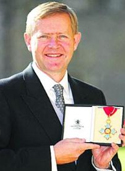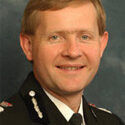Evidence-Based Policing Hall of Fame
Peter Neyroud, CBE, QPM
Inducted April 2010
Nominated by Lawrence Sherman, Cambridge University and David Weisburd, George Mason University & Hebrew University
Biography:
Peter Neyroud was the Chief Executive of the National Policing Improvement Agency (NPIA) in the United Kingdom until his retirement in December 2010. He was previously Chief Constable of Thames Valley Police from 2002 and Vice-President of the Association of Chief Police Officers (ACPO) with responsibility for the NPIA and the reform of ACPO. In 2011 he was named a Most Excellent Commander of the Order of the
British Empire (CBE). Read more about the honor here.
He has an Honours Degree in Modern History from Oriel College, Oxford University, an MSc in Professional Studies (Crime and Policing) from Portsmouth University and diplomas in Applied Criminology (University of Cambridge) and Business Excellence.
A police officer since joining Hampshire Constabulary in 1980, he rose through the ranks to become Detective Superintendent with responsibility for intelligence, covert operations and drug strategy.
He was appointed Assistant Chief Constable of West Mercia Constabulary in 1998, was appointed Deputy Chief Constable two years later and was awarded the Queen’s Police Medal (QPM) for Services to Police in 2004.
Peter Neyroud is a widely published author on policing including co-authoring a number of books (e.g. Policing, Ethics and Human Rights; Dictionary of Policing), chapters for books, and articles in peer reviewed journals (see selected publications below). He also serves as a member of the Campbell Collaboration Crime and Justice Steering Group, a jury member for the Stockholm Prize in Criminology, and a general editor of the Oxford Journal Policing: A Journal of Policy and Practice.
Evidence-Based Research and Practice:
Chief Constable Neyroud’s interest in evidence-based research and practice came early in his career. In 1981, as a young Police Constable, he was responsible for evaluating the Havant Policing Scheme, an experimental neighbourhood policing scheme in Hampshire. He then designed and evaluated an early hot spots experiment in Southampton to reduce violent crime clusters in the St. Marys area of Southampton.
In 1990, as part of his Masters degree, he evaluated a multi-agency partnership to tackle racial violence and harassment in Southampton. The evaluation was a case study, using semi-structured interviews, data and participant observation. The evaluation was published in a peer reviewed journal and this work formed the basis of the national approach to tackling racial violence adopted by the Commission for Racial Equality.
As an Assistant Chief Constable in West Mercia Chief Constable Neyroud created a ground breaking university-police department partnership between West Mercia Constabulary and the University of Worcester. He sponsored nationally important research on areas as diverse as officers reactions to firearms incidents (leading to the development of new firearms training), police use of distance learning training, and the implementation of Beat Managers (West Mercia’s rural policing approach).
In his final appointment as Chief Constable in Thames Valley, he was one of the original group of five Chiefs responsible for the National Reassurance Policing Programme, a model of neighborhood policing designed to improve resident confidence in the police and also sponsored one of the sites for Lawrence Sherman’s research on restorative justice and helped to ensure that the national research programme was a randomized controlled trial.
Neyroud continues to advocate for evidence-based approaches in policing as the Chief Executive of the National Policing Improvement Agency of the U.K. and has become a champion in changing police culture and standards related to use of research in police practice. Thus far the NPIA has developed a new national Knowledge Strategy, undertaken its own randomized controlled trials (RCTs) (notably the one just finished on methods of informing the public- see link to the right), sponsored RCT’s in four forces in the UK, commissioned six Campbell systematic reviews, and sponsored over 100 senior police officers to attend the Cambridge Masters programme with a strong encouragement to undertake and publish primary research
Statement from Inductee:
Policing has been a 30 year passion for me. It was an accidental passion because it had never been my ambition to be a police officer. As a third year History undergraduate at Oriel College, Oxford University, I was looking at careers in industry or as an academic. However, I was given a first year student to look after – a Police Inspector from Thames Valley Police – and, in the course of an evening introducing him to the beers of Oxford he suggested that I might like to become a police officer. He arranged for me to spend some time at the local police station and I was hooked… I joined Hampshire Constabulary 12 months later on finishing my History degree.
I had not imagined that I would be using my graduate skills within my first year, but I had not counted on my then Chief Constable, a blunt ex-Durham miner, John Duke. He believed in experimentation. He had invested in research of his ideas about using cautions for young people instead of prosecutions. Now, he brought me in to shape and evaluate an innovative local policing approach in Havant in Hampshire. I spent a couple of months of my probation researching and evaluating the scheme and then assisted the Chief to roll the scheme out across the force. I still have a copy of my research reports and the presentation that I made to the Police Authority. I was commended for the work, which made a lasting impact on the force.
3 years later he pulled me back from an enjoyable stint as a Detective and Uniform Sergeant in Aldershot. This time he wanted me to explore how to tackle violent crime in Southampton, evaluating a ‘hotspot policing’ approach that the local Division had been trying out. I learnt a lot from both experiments: pilots are relatively easy (especially if they are supported by additional resources) but rolling out across the force takes real leadership and much more than just a research report; the power of a Chief Constable who believes in evidence and is prepared to trust a researcher to report objectively; I needed better research skills (I registered for a Masters in Criminology a year or two later).
My second Chief, Sir John Hoddinott, was my greatest mentor. I worked for him for two years as his national staff officer, when John was the President of the Association of Police Officers. In that role I led for the police service on the response to the Royal Commission on Criminal Justice. I worked hard to create a way forward for the police service that would progressively improve our performance within the criminal justice system, using the 22 research studies that had been commissioned by the Royal Commission as my starting point. At the same time, John and I were also playing a prominent role in an Independent Inquiry into the Roles and Responsibilities of the Police, supported by the UK Police Foundation. The Inquiry brought both of us into a debate with almost all the most prominent criminologists in the UK at the time. I learnt that a great deal of what passed for research was poor, opinion based and amounted to little more than comment.
With John’s support, I was selected as an Assistant Chief Constable, moving force to West Mercia in the West Midlands, but not before I had had a year of Cambridge Criminology. For me, this was a critical year. Quite different from my Portsmouth Masters, Cambridge made me focus much more on Applied Science. I deliberately set out to write essays that were of a quality capable of being published and then got commissioned to write a book on Police Ethics and Human Rights, which I finished alongside my role as an Assistant Chief Constable… I think it is crucial that more serving police officers write and publish in peer reviewed journals and since my first foray into print I have worked hard to create the arena for that publishing. Now, as the Editor of the Oxford Journal, I think I have found a vehicle to enable this to happen.
As both an Assistant and then as Chief of Thames Valley, I realised quickly that research was critical to developing the force. I created research partnerships with the local universities to give Masters and Ph.D. students access to the force in return for a focus on topics of interest to the force. I also encouraged high potential officers to do research degrees so that they were better prepared than I had been at their stage of career. As Chief Executive of the NPIA I have carried on this mission, sponsoring over 100 potential Assistant Chiefs through the Masters programmes at Cambridge or University College London. It is not good enough to support the research, or seek to disseminate it, you have, as a leader in policing, to create fertile ground through education.
Within the NPIA, I have had responsibility for the national research strategy and functions for policing in the UK. It has been a very tough role because, whilst I have made headway with educating police officers on the importance of research in influencing policing policy, I have had a much greater struggle with civil servants. The real leadership challenge for Chiefs will always remain creating the coalitions and partnerships that allow new things to be tried and existing research to be embedded in practice, whilst the multitude of evidence free initiatives that sparkle brightly for governments are discarded.
What does all this mean for the profession of policing and the development of evidence? Above all, I think it means that as police leaders the most powerful thing we do is to foster education at all levels of the service that emphasises inquiry and builds the skills and confidence for every police officer to improve the service. For individual police officers seizing opportunities to learn and think differently about the service we provide is a crucial way to do things better. Many police leaders see their legacy as the institution or a major operation, but the real legacy is a succeeding generation of police officers provided with the capability and capacity to do the task of policing better because they have been equipped with better evidence and the education to use it. This legacy takes faith and risk taking rather than a false contentment with things as they have always been.
Contributions to Grants, Publications, and Projects:
- Weisburd, David, & Neyroud, Peter. (2011). Police science: Towards a new paradigm. Washington, DC: National Institute of Justice/Harvard University Executive Session on Policing and Public Safety.
- Neyroud, Peter. (2009). Squaring the circles: Research, evidence, policy-making, and police improvement in England and Wales. Police Practice and Research, 10(5-6), 437-449.
- Neyroud, Peter. (2008). Past, present, and future performance: Lessons and prospects for the meaurement of police performance. Policing: A Journal of Policy and Practice, 2(3), 340-348.
- Neyroud, Peter. (2007). Editorial: community policing. Policing: A Journal of Policy and Practice, 1(2), 127-129.
Links:
- National Policing Improvement Agency
- Center for Evidence-Based Crime Policy Advisory Board
- Home Office Press Release Announcing Neyroud’s Appointment as Chief Executive of NPIA
- Policing: A Journal of Policy and Practice (Neyroud serves as one of the general editors)
- A National Experiment to Test the Impact of Information Provision about Crime and Policing on Public Perceptions
- How to Make a Difference – Becoming a Police Officer
Update:
 Peter Neyroud was also recently named a Most Excellent Commander of the Order of the British Empire (CBE).
Peter Neyroud was also recently named a Most Excellent Commander of the Order of the British Empire (CBE).

